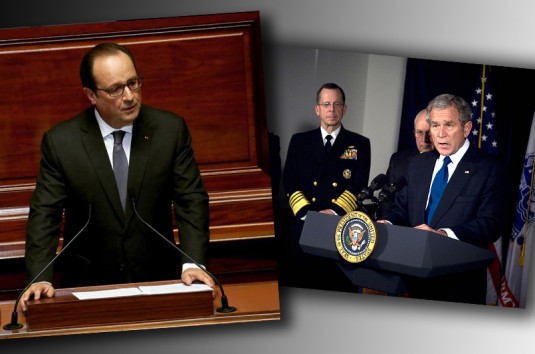
France once led the world in lambasting George W. Bush’s “war on terror”. But as François Hollande looks to enshrine emergency powers in the constitution, the country’s leaders are suddenly sounding like the US president they once held in contempt.
No, it’s never waterboarded terror suspects, or outsourced its torture to other countries under a top-secret program of “extraordinary rendition” overseen by the nation’s spymasters.
And – as far as we know – it has no sprawling military prison on an overseas naval base where hundreds of orange-clad alleged jihadists are held without trial.
In a year bookmarked by horrific attacks in the heart of Paris, France has managed to steer clear of the most notorious abuses of America’s anti-terror fight after 9/11.
At the same time, the country’s leaders have tightened the spigot on basic civil liberties to an alarming degree, with little supporting evidence of a clear dividend in terms of greater security.
Glenn Greenwald, the journalist who brought Edward Snowden’s revelations about mass NSA surveillance to the world’s attention, told me in a recent interview that a fearful population is a submissive population.
While Parisians have made a valiant effort to get on with their lives, the public mood is tinged with apprehension – abetted by a non-stop drumbeat of security alerts and terror-related arrests.
More ready to cede freedoms?
The French, presided over by a monarchical president who embodies “Republican” values, have proven more willing than Americans in the wake of the 9/11 attacks to cede their civil liberties if it makes them safer.
More than 90 percent of adults in France support the prolonged state of emergency championed by the government, a study by French polling firm Ifop revealed a day after the attacks.
A similarly overwhelming majority want more police officers and stricter border controls.
Under the State of Emergency imposed in the hours after the November 13 attacks, police have carried out nearly 3,000 raids on private homes and businesses, ordered house arrest for hundreds of others.
They have also enforced a ban on large public gatherings – resulting in the cancellation of a planned climate march in Paris on the eve of the COP21 summit in late November.
With rare exception, not even the sweeping US Patriotic Act – a deceptively upbeat name for a scary Congressional infringement on civil liberties – barred street demonstrations. It was a nod, perhaps, to the constitutionally guaranteed “right to peaceably assemble”.
Stripping citizenship
And on Wednesday, France’s Prime Minister, Manuel Valls, confirmed that among the constitutional reforms being proposed by François Hollande is a controversial provision that would allow French citizens who hold dual citizenship to lose their French passport if convicted of a terrorism offense.
Until now, only “naturalised” – and not native-born – French could be stripped of their French passport, as six people have since 2012.
Many, especially on the political left, see a dangerous precedent being set as many “dual” French citizens are also citizens of one of France’s former colonies in North Africa.
The idea, seen by critics as overly broad and vague, or morally dubious, has been championed by the Far Right party of Marine Le Pen. It’s been co-opted by the mainstream right as it looks to steal the Far Right’s thunder – and woo its voters – on security issues.
Some legal experts see France at a tipping point.
“Under the pressure of a public opinion that’s fed a constant stream of horrific images, and abetted by politicians looking to score some political points, it can be very tempting to want to prolong a situation in which the cop wins out over the judge, and security trumps freedom,” Dominique Rousseau, a professor of constitutional law at the Sorbonne, in Paris, wrote in a recent op-ed piece.
Then there’s…Egypt
Catherine Hagueneau-Moizard, who teaches public law at the University of Strasbourg, suggests that France’s bid to “constitutionalise” the State of Emergency makes it an exception – and not of the positive kind – among democracies.
She notes that Germany’s constitution provides for special restrictive measures – but only in the case of an attack by a foreign army, not to fight terror.
Only Egypt, under a semi-permanent state of emergency since 1981 (it currently only applies to the Sinai region), is the only country where the police have been granted their broader emergency powers at the behest of the president, and on the executive’s sole initiative.
But Egypt is run by a military strongman who came to power in what much of the world regards as a coup against the country’s first democratically elected president.
Constitutional overkill
What makes France’s constitutional gambit even more baffling to some observers is the fact that it’s not really necessary: it already contains tough enough provisions to deal with threats to national security.
One of those clauses – article 16 – authorises exceptional powers, while the other, article 36, allows for the Council of Ministers to declare a state of siege.
Hollande argues that neither article is adapted to the modern threat of a war against terror, hence the need, in his view, to outfit the constitution with a terror-ready option for the 21st century.
France’s leaders have been at pains to reassure their compatriots that the country’s anti-terror measures come with a democratic seal-of-approval.
But for those feeling queasy about an endless State of Emergency such words ring as hollow as that Orwellian clock striking thirteen in 1984.
France24

Leave a Reply
You must be logged in to post a comment.